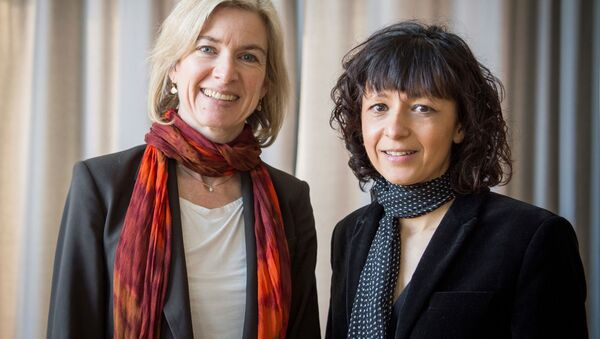Kako je objavila Švedska kraljevska akademije nauka, one su nagrađene zbog „razvoja metode inženjeringa genoma“.
Emmanuelle Charpentier, awarded this year’s Chemistry Prize, was born in 1968 in Juvisy-sur-Orge, France.
— The Nobel Prize (@NobelPrize) October 7, 2020
She is Director of the Max Planck Unit for the Science of Pathogens, Berlin, Germany.https://t.co/We8u3YEtXEhttps://t.co/RoRDbHAOHx#NobelPrize pic.twitter.com/oM2oswF1Ca
Daudna i Šarpentje su 2012. godine izumele genetske makaze koje su od tada počele da se koriste širom sveta.
This year’s Chemistry Laureate Jennifer A. Doudna was born in 1964 in Washington, D.C, USA.
— The Nobel Prize (@NobelPrize) October 7, 2020
She is a Professor at @UCBerkeley, USA and Investigator at @HHMINEWS.https://t.co/GMyJGnBMlThttps://t.co/CtXW7pRzop#NobelPrize pic.twitter.com/FK2tMfunW1
Zahvaljujući njima, naučnici mogu sa velikom preciznošću da menjaju DNK životinja, biljaka i mikroorganizama.
In their natural form, the CRISPR/Cas9 genetic scissors recognise DNA from viruses, but Emmanuelle Charpentier and Jennifer Doudna – awarded this year’s #NobelPrize in Chemistry – proved that they could be controlled so that they can cut any DNA molecule at a predetermined site. pic.twitter.com/zlOfyENt8V
— The Nobel Prize (@NobelPrize) October 7, 2020
„Ova tehnologija, koja ima revolucionarni značaj za nauku, doprinosi novim terapijama borbe protiv kancera. Sada je san o potpunom izlečenju naslednih bolesti vrlo blizu“, navodi se u obrazloženju.


